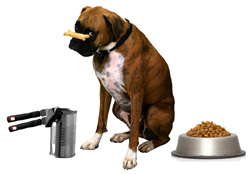Processed Pet Food – Friend or Foe?
An article in the Mail Online Is the pet food you are serving up killing your four-legged friend? (and making your vet rich) tells us about the case of pet owner Fiona MacMillan who was anxious to do the very best for her cat, Jaggers. Fiona asked her vet for some advice on feeding and was directed me to a well-known brand of dried food. “I was happy to take her professional advice” says Fiona.

The Mail Online article says that today Fiona “bitterly regrets her decision” to feed Jaggers on the convenience food. When he was just seven, Jaggers was diagnosed with kidney disease. The same vet prescribed some more dried food, especially designed for cats with urinary problems. Despite following her vet's advice, the Mail Online article explains that Jaggers collapsed three months later and was so unwell he had to be put to sleep.
The Mail article explains that Fiona did some research via a website by pet nutritionist Lisa Pierson that processed dried food - the exact kind she had been feeding Jaggers for years - is linked to urinary and kidney problems. Another vet agreed and told Fiona that if she had fed Jaggers a more natural diet - such as raw meat or cooked chicken - he might never have fallen ill.
Mail Online says “Her story is sure to concern anyone with a pet, particularly because few people are aware of the little-publicised concerns about processed pet foods - and that includes 'wet' (i.e. tinned and packet) foods as well.”
“And part of the problem, as a Mail investigation can reveal, is that much of the veterinary industry is inextricably linked to the pet-food manufacturers.”
“Research into pet food is carried out by the pet-food companies but, more surprisingly, the training of vets at some universities is also funded by pet-food manufacturers. Crucially, lectures on nutrition at a number of vet schools, and for veterinary nurses at individual practices, are also often paid for - and even taught - by these huge corporations, giving them the ideal platform to promote their products. One could argue that given this information, it's hardly in vets' interests to promote a more natural diet for pets.”
That suspicion has certainly occurred to Catherine O'Driscoll, who like Fiona MacMillan saw a pet die. In her case, it was all three of her golden retrievers, all at a relatively young age.
Catherine explains “I had two other dogs, and was determined to see them live longer. And it was after I read an article in a magazine by an Australian vet, which explained that feeding animals processed food could be bad for their health, that I switched away from commercial processed food.”
The Mail asks if processed dog food in cans, pouches or dried form are as bad for our pets health as junk food is to ours.
The pet food industry is fairly modern. Only a generation or so ago families tended to feed their pets table scraps. Prepared pet foods are a relatively new luxury. Yet today the pet food industry is valued at £2 billion and growing, say Mail Online.
“The pet-food manufacturers appear to be promoting their brands with the help of veterinary practices, sponsoring food displays in surgeries which help to generate business for vets (via commission and the fact that some specialist food can only be bought at veterinary surgeries).” they say.
“Critics claim that with all this bombardment from pet-food companies, many vets and consumers are brainwashed into believing processed food is the only diet their pet should be on.”
Mail Online quotes TV vet Joe Inglis: “Over the past few years, many additives have been banned from human food, but pet food is still pumped full of similar chemicals.”
“It's time manufacturers were more honest about what is really in their foods, and were forced to outlaw some of these artificial chemicals.”
Mail Online states that “while cat and dog food sales have soared by 85 per cent over the past decade, research by the Pet Food Manufacturers Association shows that one in three household pets is now overweight - and chronic conditions in our pets, such as diabeties, kidney and liver disease, heart disease and dental problems (all related to diet) are on the increase.”
“I don't believe today's vets get enough independent information” says Richard Allport, a vet of 36 years. “Pet-food companies have far too much influence, because much of the information on feeding cats and dogs is paid for, promoted and supplied to vets by the pet-food industry.”
This view is angrily refuted by vet Nicky Paull, says Mail Online. “The former president of the British Veterinary Association for 2008/9, she doesn't believe pet-food companies are too involved with the veterinary industry.”
She says “I would hate to be seeing cats and dogs suffering from a lack of nutrition because their owner has chosen to give them a home-made diet that lacks essential ingredients.”
The Mail Online continues by saying that “Roger Meacock, who has a practice in Swindon, is concerned that many processed foods, often described as 'premium' and 'scientifically balanced', also contain ingredients that should not be part of any dog or cat's diet.”
“Often, grain is added to canned and dried pet food to bulk it out” he says. “Basically, it is a cheaper alternative to meat. Additives to ensure the food tastes good to cats and dogs are also added.”
“But what people need to understand is that while on the outside dogs and cats have been domesticated into cuddly pets, inside a dog is 99 per cent related to the wolf, while a pet cat's digestive system is no different from a wild lion's.”
“Therefore the bulk of a healthy diet for a cat or dog should not contain processed food that is high in carbohydrate and other additives. It should revolve around raw meat, as it would do in the wild, which is good for their teeth and gums as well as animals' general health.”
Jackie Marriott, who helps run The United Kingdom Raw Meaty Bones Support and Action Group, says “Part of the problem rests with the fact that many of us as owners find these foods incredibly convenient - this is why the pet-food manufacturers have been successful.”
The Mail Online says “Unsurprisingly, the pet-food manufacturers do not agree that there's any problem with feeding animals a solely processed food diet.”
The Pet Food Manufacturers Association says: “There are concerns that feeding raw meat to pets can present a human/animal risk, such as salmonella contamination. In the case where only raw meat and bones are fed, there is an additional concern among vets and animal nutritionists that this exclusive diet may not meet the pet's needs.”
The Mail Online article concludes by wondering if a natural diet could prolong our pet’s lives, and asks whether processed pet foods are simply a money-making and dangerous mistake.
Right to Reply – Vet Joe Inglis
The following is taken with permission from Joe’s website.

As you may have seen there was an article in The Daily Mail this morning about pet food and the dangers some processed foods can potentially pose to pets’ health. I was interviewed briefly for this and I’m quoted talking about the problems that artificial additives can cause.
The rest of the article is not so great though, pedalling many of the myths and un-scientific arguments that are put forward by people who believe that all commercial pet foods are terrible and the cause of all ill health in pets. In particular the arguments that feeding foods containing carbohydrate is responsible for urinary and renal disease in cats, something which has been clearly shown not to be true, and the claim that the only healthy way to feed a pet is on raw chicken wings.
To set the record straight, here are a couple of paragraphs from my forthcoming book ‘Your dog and You’, which is due to be published this summer, which deal with these issues:
Carbohydrates: There have been many scare stories about this subject and the internet is awash with unfounded allegations claiming that the feeding of carbohydrate to cats and dogs is responsible for all manner of diseases, including urinary diseases, diabetes, cancer and many others. However, none of these issues are backed up with any credible evidence, and a recent meta-analysis of all the data surrounding the issue of feeding carbohydrate to pets by Dr Buffington of Ohio State University Hospital concluded that, and I quote, “Current published evidence thus does not support a direct role for diet in general, and carbohydrates in particular, on disease risk in domestic cats.” Dr Buffington goes on to explain how genetic, environmental and lifestyle factors (such as indoor-only housing of cats) play a far more significant role in many of the diseases in which effects are attributed to carbohydrate-rich diets.
So I am happy that the scientific evidence strongly refutes any link between the feeding of carbohydrate to pets and health problems and would recommend that this is not an issue that you should be worried about – far better to make sure the food you feed your dog is made with good quality ingredients, including good quality carbohydrates such as rice and oats, and is free from artificial additives which we know can cause harm.”
Raw feeding: There are many people who advocate feeding dogs on a diet that replicates as closely as possible their ‘ancestral diet’ – primarily raw meaty bones and scavenged scraps. There is logic in this argument, as evolution has worked over many hundreds of thousands of years to perfect the canine digestive tract to suit this kind of diet, so one could therefore easily assume that a raw diet based on this evolutionary history would be the best possible. But there’re also flaws in the argument, and one of the main ones is the assumption that just because a dog evolved to eat a raw diet scavenged from left over carcasses that this is the best diet it could possibly eat. The only reason dogs ate raw scraps was because that was all there was available and they developed their niche role as scavengers – but that does not mean that their digestive tracts have evolved in such as way that other foods might not be even better than scraps. It’s a bit like saying that our eyes evolved to spot predators and find food and therefore that is the best way to do those things – whereas most people would agree that modern technological advances such as binoculars or cameras or computers can help us to do these things better by working with our naturally evolved attributes.
I believe that while our dogs undoubtedly evolved to eat raw scraps scavenged from carcasses, we as their modern human companions can do an awful lot better than simply feed them the same subsistence diet they would get in the wild. To put it in other terms, would you prefer a modern cooked diet prepared using all the nutritional knowledge we’ve gained as an advanced society, or the same diet your stone-age ancestors used to eat? Assuming the answer is a modern diet, then I hope you can see the parallel for our dogs and the reason why we should not be persuaded by emotive arguments from the often passionate raw feeding lobby that only an ancestral diet will do.
I hope these articles help counter some of the bad science put forward in the article in the Mail!
Joe Inglis
Right to Reply – Vet John Burns
The following is taken with permission from the Burns website.

Today’s Daily Mail article launches a two-pronged attack on the veterinary profession and the pet food industry. As a member of both I feel I am well placed to comment.
Starting with the vets, members of the profession are portrayed as gullible and greedy. The self-proclaimed spokespeople tell us that vets are easily influenced by the pet food industry and as a result promote certain foods to line their pockets, with complete disregard for the welfare of their patients. In reality, probably less than 3% of pet food is sold through veterinary practices, and that is almost wholly at the better end of the market. The vast majority of vets are conscientious in promoting the welfare of pets; many recommend Burns even when they don’t sell it.
There are indeed major concerns about the quality of pet foods. But the problem lies with the type and quality of ingredients which are used in most pet foods. That is precisely why I entered the pet food business myself. When I was in practice I used to recommend home made food, but cooked rather than raw. That gave excellent health benefits but is impractical for most people. I eventually realised that if pets were to be fed well, the food had to be conveniently available. The same health benefits can be seen when feeding good quality cooked pet food as with those claimed for raw food.
The notion that domestic dogs are physiologically the same as wild dogs is completely wrong. Domestic dogs have been accustomed to eating a cooked cereal-based diet for thousands of years. Their needs are different anyway; a diet based on meat which is high in protein and fat is completely inappropriate for most domestic dogs.
The responsibility of the pet owner in promoting health through diet has been completely overlooked in this article. At Burns we find that many owners consistently over feed their pets and this causes many different health problems as well as excessive weight gain.
The article quotes Catherine O’Driscoll who says that three of her dogs died prematurely because of poor pet food. I saw her home video of those dogs and they appeared to be so grossly overweight they were not walking – they were waddling!
Royal Canin is criticised for offering Pet Health Counsellor Courses. We need more people to be well versed in pet health counselling as lack of knowledge about health and nutrition is a major problem for pet owners.
John Burns
By Jenny Prevel
© D for Dog www.dfordog.co.uk
This article belongs strictly to D for Dog and we do not authorise the copying of all or any part of it.
